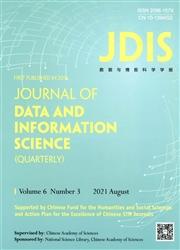精英数学家协作网络的社群检测
IF 1.5
3区 管理学
Q2 INFORMATION SCIENCE & LIBRARY SCIENCE
引用次数: 0
摘要
目的 本研究着重了解数学家之间的合作关系,尤其是那些受人尊敬的精英数学家之间的合作关系,以揭示他们的社群结构,并评估他们对数学领域的影响。设计/方法/途径 利用两种社群检测算法,即 "贪婪模块化最大化"(Greedy Modularity Maximization)和 "信息图"(Infomap),研究数学家之间的合作模式。我们对数学家的中心性进行了比较分析,强调了获奖个人在连接网络角色(如 Betweenness、Closeness 和 Harmonic centrality)中的影响。此外,我们还调查了精英数学家在不同社区中的分布情况以及他们在不同数学子领域中的关系。研究结果 研究发现,获奖数学家在连接网络角色方面发挥着巨大影响。精英数学家在网络中的分布是不均衡的,主要集中在特定群体中,而不是均匀分布。其次,研究发现,不同的数学子领域与社区之间存在正相关关系,这表明从事相关领域研究的科学家之间存在合作倾向。最后,研究表明,社区内研究多样性的减少可能会导致精英科学家更集中于该特定社区。研究局限性 该研究的局限性包括:研究对象仅限于数学家,这可能会限制研究结果在更广泛科学领域的适用性。人工收集数据的问题影响了有关协作网络结论的可靠性。实际意义 本研究为了解精英数学家如何合作以及知识如何在数学界传播提供了宝贵的见解。了解这些合作行为有助于数学家和机构之间制定更好的合作策略,从而有可能促进数学领域的科学进步。原创性/价值 该研究为了解数学领域的合作动态增添了价值,为进一步探索和研究提供了一个独特的角度。本文章由计算机程序翻译,如有差异,请以英文原文为准。
Community detection on elite mathematicians’ collaboration network
Purpose This study focuses on understanding the collaboration relationships among mathematicians, particularly those esteemed as elites, to reveal the structures of their communities and evaluate their impact on the field of mathematics. Design/methodology/approach Two community detection algorithms, namely Greedy Modularity Maximization and Infomap, are utilized to examine collaboration patterns among mathematicians. We conduct a comparative analysis of mathematicians’ centrality, emphasizing the influence of award-winning individuals in connecting network roles such as Betweenness, Closeness, and Harmonic centrality. Additionally, we investigate the distribution of elite mathematicians across communities and their relationships within different mathematical sub-fields. Findings The study identifies the substantial influence exerted by award-winning mathematicians in connecting network roles. The elite distribution across the network is uneven, with a concentration within specific communities rather than being evenly dispersed. Secondly, the research identifies a positive correlation between distinct mathematical sub-fields and the communities, indicating collaborative tendencies among scientists engaged in related domains. Lastly, the study suggests that reduced research diversity within a community might lead to a higher concentration of elite scientists within that specific community. Research limitations The study’s limitations include its narrow focus on mathematicians, which may limit the applicability of the findings to broader scientific fields. Issues with manually collected data affect the reliability of conclusions about collaborative networks. Practical implications This study offers valuable insights into how elite mathematicians collaborate and how knowledge is disseminated within mathematical circles. Understanding these collaborative behaviors could aid in fostering better collaboration strategies among mathematicians and institutions, potentially enhancing scientific progress in mathematics. Originality/value The study adds value to understanding collaborative dynamics within the realm of mathematics, offering a unique angle for further exploration and research.
求助全文
通过发布文献求助,成功后即可免费获取论文全文。
去求助
来源期刊

Journal of Data and Information Science
INFORMATION SCIENCE & LIBRARY SCIENCE-
CiteScore
3.50
自引率
6.70%
发文量
495
期刊介绍:
JDIS devotes itself to the study and application of the theories, methods, techniques, services, infrastructural facilities using big data to support knowledge discovery for decision & policy making. The basic emphasis is big data-based, analytics centered, knowledge discovery driven, and decision making supporting. The special effort is on the knowledge discovery to detect and predict structures, trends, behaviors, relations, evolutions and disruptions in research, innovation, business, politics, security, media and communications, and social development, where the big data may include metadata or full content data, text or non-textural data, structured or non-structural data, domain specific or cross-domain data, and dynamic or interactive data.
The main areas of interest are:
(1) New theories, methods, and techniques of big data based data mining, knowledge discovery, and informatics, including but not limited to scientometrics, communication analysis, social network analysis, tech & industry analysis, competitive intelligence, knowledge mapping, evidence based policy analysis, and predictive analysis.
(2) New methods, architectures, and facilities to develop or improve knowledge infrastructure capable to support knowledge organization and sophisticated analytics, including but not limited to ontology construction, knowledge organization, semantic linked data, knowledge integration and fusion, semantic retrieval, domain specific knowledge infrastructure, and semantic sciences.
(3) New mechanisms, methods, and tools to embed knowledge analytics and knowledge discovery into actual operation, service, or managerial processes, including but not limited to knowledge assisted scientific discovery, data mining driven intelligent workflows in learning, communications, and management.
Specific topic areas may include:
Knowledge organization
Knowledge discovery and data mining
Knowledge integration and fusion
Semantic Web metrics
Scientometrics
Analytic and diagnostic informetrics
Competitive intelligence
Predictive analysis
Social network analysis and metrics
Semantic and interactively analytic retrieval
Evidence-based policy analysis
Intelligent knowledge production
Knowledge-driven workflow management and decision-making
Knowledge-driven collaboration and its management
Domain knowledge infrastructure with knowledge fusion and analytics
Development of data and information services
 求助内容:
求助内容: 应助结果提醒方式:
应助结果提醒方式:


